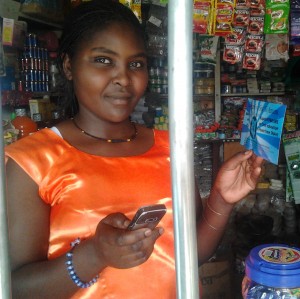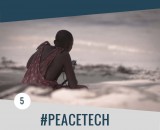SMS for Peace: Preventing Electoral Violence in Kenya with Mobile Phones

In 2007-8, post-election violence in Kenya spread throughout the country, claimed the lives of over 1,000 individuals, and displaced hundreds of thousands. Election-related violence had happened before in Kenya, but previous violence had never spread so fast and so extensively. During this troubled time, mobile phones were used to stoke and spread violence. SMS (text messages) in particular were sent to spread rumors and fear, to call for revenge, and to organize weapons distribution and attacks. Local peace activists struggled to compete with the violent actors and make their voices heard.
In 2010, I began to work with local peace activists in Kenya and together we asked ourselves – if mobile phones are an effective medium to reach people rapidly and influence behavior and perceptions, can’t we use them too? We founded Sisi ni Amani Kenya (SNA-K)-meaning “We are Peace Kenya” in Kiswahili-to amplify the voices of grassroots peace leaders and compete with flows of information promoting violence. We designed a platform that community members could subscribe to for free from their mobile phones. We did door to door outreach and in partnership with over 50 local peace groups, we subscribed over 65,000 people in more than seven target areas across the country by the time of the next presidential elections in March 2013. Once they subscribed, we could send them targeted messages on a mass scale.
Throughout the election cycle, we provided communities needed information as events unfolded. During voter registration, we reminded our subscribers to register and sent instructions. We educated them about what to expect at the polling station, and the night before the elections we reminded them what to bring to the polls. Our goal was to empower communities with the information they needed and reduce vulnerability to rumors.
Most importantly, we used our messaging platform to interrupt tensions and violence on the ground. As hostilities arose leading up to the elections, we sent messages about unity. When rumors started to spread we sent messages warning individuals against misinformation and urging them not to be manipulated. And when antagonism and small-scale violence emerged, we sent messages about the consequences of violence and the need for peace.
Our messages were based on research through focus groups, and pro bono consultation from leading ad agency Ogilvy & Mather. To encourage behavior change, we crafted our SMS using the same communication techniques and strategies employed to market Coca Cola and Ikea. During the weeks surrounding the elections, we sent 682,227 messages. In a post-election survey of nearly 8,000 subscribers, 92% believed that these messages had a positive impact on preventing violence during the election.
Many of the communities we work with are often marginalized and lacking government support. Feedback gathered from another survey of SNA-K subscribers indicated that, thanks to our texts messages, people felt greater attention was paid to the challenges faced by their communities. For example, subscribers commented on the successful impact of our messaging campaign warning youth about the consequences of their actions should they decide to participate in violence. One subscriber explained that he and his friends eventually refrained from taking part in looting that had begun after receiving a message that urged him to weigh the consequences. He was grateful that the message had prompted him to reconsider involving himself in violence.
Integrating new and innovative tools with local peacebuilding efforts also increased the visibility of local organizations. In every area where SNA-K went, we worked with local partners. Many of them said that people sought them out to thank them for the messages, and several were offered free rides on public transportation because they were recognized as “the peace people.”
Even as small-scale looting broke out in some areas, our messages of peace combined with the more visible presence of local peace actors provided a sense of security and social pressure for peace. One subscriber said, “The messages made me relax even in the midst of the violence that was happening although it wasn’t a lot of violence, but I still felt like someone was in control and watching and I knew things would be ok in the end after reading the message”, while another subscriber expressed that the messages “gave me the courage to preach peace.”
Finally, the messaging platform encouraged positive behavior and praised people for staying calm even when the situation became difficult. As one subscriber said, “the message was thanking me for being peaceful and that encouraged others to be peaceful as well, I felt so good when I got it I just had to share.”
In the end, it was Kenyans who chose peace. Even our messages, drafted with input from various groups including former participants in violence, drew upon reasons Kenyans already had for peace – economic and personal loss experienced in 2007-8; the desire to avoid manipulation by politics; the need for a bright future for their children and unity as Kenyans. Sisi ni Amani-Kenya’s initiative shows that equipping local peace activists in marginalized communities with appropriate tools to amplify their voices has the powerful potential to prevent violence and keep the peace.



Hello,
This is very exciting. Did SNAK build on the similar work of Concerned Citizens for Peace who I heard (via Peace Direct and Scilla Elworthy) did this kind of work using FrontlineSMS and ushahidi in 2008?